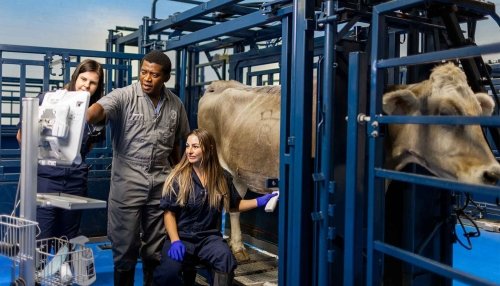
The College of Veterinary Medicine will introduce you to innovative veterinary healthcare. Our state-of-the-art facilities and hands-on learning will help you build a career as a compassionate and patient-centered member of tomorrow’s healthcare team.

The College of Veterinary Medicine (CVM) was founded in 2012 and graduated its inaugural class of 102 veterinary students in 2018. The College offers a four-year curriculum that prepares veterinarians to provide exemplary animal care and impact the world by improving animal and human health through research, scholarly activity, and service to the public. Veterinarians reduce the impact of zoonotic diseases on both people and animals, and help to maintain the integrity of the nation's food chain.
The mission of Midwestern University's College of Veterinary Medicine is to improve animal and human life through innovative veterinary education, state-of-the-art health care services, and scholarly work relevant to the principles of One Health.
CVM students spend their pre-clinical training years in classroom lectures, laboratories, and simulation lab exercises. During clinical training, students rotate through a variety of diverse veterinary care experiences, both on campus and at external sites.
As a Midwestern University veterinary student, you will:
The College of Veterinary Medicine offers a four-year program leading to the Doctor of Veterinary Medicine (D.V.M.) degree. The first 8 quarters are a combination of classroom lectures, laboratories, simulation lab exercises with standardized clients and patients, and small group student-centered learning experiences. Hands-on live animal contact begins in the first quarter and continues throughout the program. Quarters 9-13 involve diverse clinical rotation training. The majority of the time will be spent on campus in state-of-the-art clinical teaching facilities. Students will also have the opportunity to schedule off-campus clinical elective rotations at pre-approved external sites.
Our next site visit will be in 2025.
Learn more about the requirements and find quick links to relevant catalog content to guide you in your application process.
Admissions RequirementsStudents seeking admission to the College of Veterinary Medicine (CVM) must submit the following documented evidence:
Students seeking admissions to CVM must:
The mission of the Midwestern University College of Veterinary Medicine is to improve animal and human life through innovative veterinary education, state-of-the-art healthcare services, and scholarly work relevant to the principles of One Health.
Licensing Examination ScoresNAVLE Pass Rate: 89%
*Compared to the 80% pass rate required by the AVMA Council on Education
In March of 2012, Midwestern University in Glendale identified a need both for a localized veterinary healthcare training program and for veterinary clinical, research, and community outreach services in the Phoenix metropolitan area. The University's adoption of the One Health Initiative, which fosters collaboration between specialists in human and animal medicine and research, was a key strategic factor in the CVM's development. Midwestern's emphasis on patient-centered healthcare education allows for a significant crossover between human and animal care.
College of Veterinary Medicine (CVM) students benefit from highly experienced faculty who are committed to teaching and in the process can also help local veterinarians with difficult cases. Experiential education is a centerpiece of the CVM's curriculum, and students are exposed to case scenarios as early as their first year. Faculty and students combine their skills and specialties to offer patient care both at Midwestern University-hosted facilities and mobile clinical programs.
At the end of 2015, the College of Veterinary Medicine undertook a new community initiative, backed by the generosity of Phoenix-based PetSmart Charities, to develop a state-of-the-art Midwestern University Mobile Clinic. The new Mobile Clinic was built from the ground up as a platform to provide hands-on shelter medicine experience for Midwestern's students while bringing surgical services and basic medical care to animals in remote locations and shelters.
Spearheaded by Assistant Professor Rachael Kreisler, V.M.D., M.S.C.E., whose practice is limited to shelter medicine, the Mobile Clinic is utilized for weekend trips to provide spay and neuter surgeries and animal care for community shelter partners such as the HALO Animal Rescue and the Animal Defense League of Arizona (ADLA), as well as the Salt River Pima Maricopa Indian community. The Clinic also makes monthly visits to the LifeBridge Resource Center as part of Midwestern University's Health Outreach through Medical Education (H.O.M.E.) program, which provides multidisciplinary healthcare services to the homeless.
The Mobile Clinic is ideal for resource-limited shelter and community environments; areas with either a total lack of access or restricted access to veterinary services. The Mobile Clinic also functions as a traveling center for Trap Neuter Release (TNR) events to spay and neuter stray cats.
Working with the Mobile Clinic, veterinary students at all stages of their education receive first-hand experiential education. First-year veterinary students provide check-in, preparatory assistance, examinations, vaccinations, and cat neuters, while second- through fourth-year student volunteers handle surgical and anesthetic duties, supervised by Dr. Kreisler and other CVM faculty. Shelter medicine and pet care in remote or isolated communities also exposes them to cases that otherwise would only be reviewable in abstract textbook examples.
Midwestern University College of Veterinary Medicine is fully accredited through the American Veterinary Medical Association's Council on Education (AVMA - COE).
For more information regarding accreditation procedures and policies: AVMA Council on Education, 1931 N. Meacham Rd. Suite 100, Schaumburg, IL 60173; phone: 847-285-6625 or 847-285-6625.
Explore details regarding your specific College/Program.